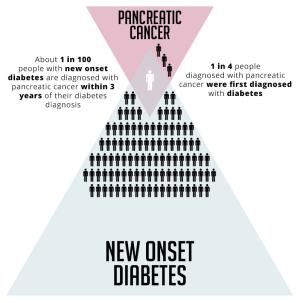Date Posted, by DCP Staff
Pancreatic Cancer – New Onset Diabetes
About 1 in 100 people with new onset diabetes are diagnosed with pancreatic cancer within 3 years of their diabetes diagnosis; 1 in 4 people diagnosed with pancreatic cancer were first diagnosed with diabetes.
See a list of participating sites on ClinicalTrials.gov.
The National Cancer Institute is leading a project to create a cohort of people who are newly diagnosed with diabetes in the hopes that this group, who are at increased risk of developing pancreatic cancer, provide the clues in their blood and tissues to unravel some of the unknowns about this highly fatal cancer. The New Onset Diabetes Study (NOD) will include 10,000 people ages 50 to 85 across the United States.
Diabetes is a disease that occurs when your blood glucose is too high. The hormone insulin, made by the pancreas, is responsible for regulating blood glucose, so having diabetes signals a problem with the pancreas.
NCI, in partnership with the National Institute of Diabetes and Digestive and Kidney Diseases (NIDDK), funded the Consortium for the Study of Chronic Pancreatitis, Diabetes and Pancreatic Cancer (CPDPC). The NOD study is a critical part of this project to gain insight into the pathophysiology of chronic pancreatitis and its associated illnesses: chronic pain, pancreatic insufficiency, Type 3c diabetes and the diabetes/pancreatic cancer association. The multidisciplinary teams are also studying the development of pancreatic cancer in newly diagnosed diabetic patients.
Over 90% of pancreatic cancer is sporadic, meaning it occurs in people without a family history of the disease. It is both relatively rare (about 3% of cancers diagnosed in the U.S.) and very deadly (fewer than 10% of those diagnosed live more than 5 years). There is no identifiable high-risk group for sporadic pancreatic cancer, few high-quality biospecimens are available to conduct tests of biomarkers, there are few biomarkers of early detection to test, and no imaging techniques to find pancreatic cancer early in its development. Finding ways to identify this cancer early is critical to learning how to prevent it and to be able to treat it in earlier stages.
People who are over age 50 who recently developed diabetes (referred to as new onset diabetes) are at higher risk of being diagnosed with pancreatic cancer within three years of being diagnosed with diabetes (compared to those without diabetes). One study determined that within three years of being diagnosed with diabetes, 85 out of 10,000 (0.85%) people will be diagnosed with pancreatic cancer. This number may seem small, but that less than 1% of people with diabetes represents one quarter of all patients with pancreatic cancer.
An estimated 30.3 million adults in the United States have diabetes (9.4% of the US population), and while 23.1 million know their diagnosis, another 7.2 million are not yet diagnosed. About 84.1 million adults—about 1 in 3—have prediabetes, which usually occurs in people who already have some insulin resistance or whose beta cells in the pancreas aren’t making enough insulin to keep blood glucose in the normal range. These people have a 50% chance of developing diabetes over the next 5 to 10 years. The information gained from NOD could benefit these people.
“NOD will play an important role in addressing these challenges,” said Jo Ann Rinaudo, Ph.D., a program director in the NCI DCP Cancer Biomarkers Research Group who is involved in NOD. This prospective cohort of subjects >50 and ≤85 years of age with new onset diabetes (NOD) is being recruited, with the goals of:
- Estimating the probability of pancreatic cancer in the NOD Cohort;
- Establishing a biobank of clinically annotated biospecimens;
- Facilitating validation of emerging tests for identifying NOD subjects at high risk for having pancreatic cancer using the clinically annotated biospecimen reference set; and
- Providing a platform for the future development of an early detection protocol for sporadic pancreatic cancer in New Onset Diabetes subjects that incorporates imaging and clinical parameters.
The NCI Community Oncology Research Program (NCORP) is participating in creating the cohort. See box for list of participating centers and a link to the protocol.
Statistics
- 84.1 million adults have prediabetes. 1 in 2 (42 million) of them will become diabetic within 10 years.
- 30.3 million adults in the US have diabetes. 1 in 100 will be diagnosed with pancreatic cancer in 3 years.
- Of the 56,770 new cases of pancreatic cancer in the U.S. in 2019, at least 14,000 had recent diabetes diagnoses.
Places Recruiting to the New Onset Diabetes Cohort
View all Recruiting Sites
California
- Cedars Sinai Medical Center
Los Angeles - Greater Los Angeles Veterans Affairs Medical Center
Los Angeles - Kaiser Permanente Northern California
Oakland - Kaiser Permanente Southern California
Los Angeles - Stanford University Medical Center
Palo Alto - University of Southern California Medical Center
Los Angeles
Florida
- Advent Health Translational Research Institute
Orlando - University of Florida
Gainesville
Illinois
- Carle Foundation Hospital
Urbana
Indiana
- Univeristy Hospital, Indiana University Health
Indianapolis
Louisiana
- Ochsner Medical Center
New Orleans
Michigan
- Henry Ford Health System
Detroit - St. Joseph Mercy Health System
Ypsilanti
Minnesota
- Mayo Clinic
Rochester
Ohio
- The Ohio State University Wexner Medical Center
Columbus
Pennsylvania
- University of Pittsburgh Medical Center
Pittsburgh
South Carolina
- Gibbs Cancer Center & Research Institute
Spartanburg
Texas
- Baylor College of Medicine
Houston
Wisconsin
- Marshfield Clinic Health System Recruiting Marshfield
Last updated: March 8, 2022
If you would like to reproduce some or all of this content, see Reuse of NCI Information for guidance about copyright and permissions. Please credit the National Cancer Institute as the source and link directly to the blog post using the original title, for example: "New Onset Diabetes Cohort Sought to Unravel Complexities of Pancreatic Cancer Development was originally published by the National Cancer Institute." For questions, contact us at CancerPreventionBlog@mail.nih.gov.

